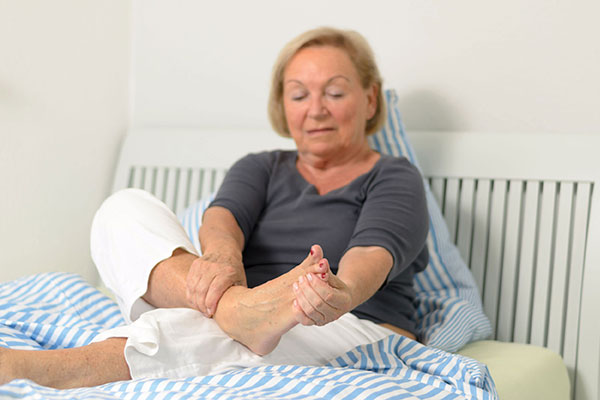Chemotherapy-Induced Peripheral Neuropathy
What Are the Symptoms? And How Can I Manage this Common Side Effect of Chemotherapy?
by Robert Knoerl, PhD, RN, and Grace A. Kanzawa-Lee PhD(c), RN, with Ellen M. Lavoie Smith, PhD, APRN, AOCN, FAAN
Chemotherapy treatments for certain types of cancer may cause a common nerve condition called chemotherapy-induced peripheral neuropathy, or CIPN for short.
What are the symptoms of CIPN?
The symptoms of CIPN can feel like your hands or feet are falling asleep (numbness) or are getting poked by pins and needles (tingling). Sometimes, it can feel like burning, shooting, or electric shock-like pain in your hands or feet. CIPN symptoms occur because some kinds of chemotherapy may damage your peripheral nerves, which are the nerves farthest from your brain, such as in your hands and feet. This peripheral nerve damage is thought to cause CIPN.
Who is at risk of developing CIPN?
Notable CIPN affects about 68 percent of cancer survivors receiving neurotoxic chemotherapy drugs, such as paclitaxel, docetaxel, oxaliplatin, cisplatin, carboplatin, vincristine, bortezomib, and thalidomide. This includes people with breast, ovarian, GI, lung, bone, and blood cancers (like lymphoma or leukemia). GI cancer survivors receiving oxaliplatin are also prone to experiencing severe cold sensitivity in their face, throat, and hands. CIPN is less common in individuals receiving carboplatin or other non-neurotoxic chemotherapies.
Chemotherapy-induced peripheral neuropathy affects about 68 percent of cancer survivors receiving neurotoxic chemotherapy drugs.
The risk of developing CIPN increases with each infusion of chemotherapy received. The symptoms of CIPN can begin as early as after the first infusion. Usually, CIPN symptoms are most severe during the first week after a chemotherapy infusion and then begin to decrease. While CIPN symptoms should decrease after you’ve completed all your chemotherapy treatments, some survivors still report CIPN that lasts months or even years after chemotherapy treatment is over. You may be at a greater risk of developing CIPN if you already have neuropathy from other causes, such as diabetes, before starting chemotherapy treatment. Some lifestyle factors may also increase your risk, such as smoking, consuming a lot of alcohol, not getting enough vitamins in your diet, and a lack of physical activity.
How can CIPN affect me?
After several cycles of chemotherapy, CIPN may become so bad that it affects your usual activities. Although numbness, tingling, and pain are most common, other symptoms of CIPN, such as muscle weakness and cramps, can also occur. CIPN symptoms can make it difficult to write, climb stairs, hold a fork or knife, play sports, or do other activities without tripping or falling.
How is CIPN prevented or treated?
Researchers are continually working to discover new treatments for the prevention or treatment of CIPN to decrease the negative effect of CIPN on cancer survivors’ quality of life. Right now, no effective medicines to prevent CIPN are known. If CIPN starts to get in the way of your usual daily activities, your doctor may decrease the dose of the chemotherapy causing the neuropathy. For long-lasting, painful CIPN, duloxetine (Cymbalta) may help to alleviate your symptoms, especially if your CIPN is caused by paclitaxel or oxaliplatin. However, less is known about whether duloxetine works to improve nonpainful CIPN symptoms, such as numbness or tingling, or CIPN that is caused by other neurotoxic chemotherapies. If duloxetine does not help your CIPN symptoms, your provider may prescribe another medicine such as gabapentin or pregabalin. These medicines have not been shown to significantly improve CIPN but have been helpful in treating other types of nerve pain not caused by chemotherapy.
Research is starting to show that nonmedical treatments might help reduce CIPN. Nonmedical treatments include exercise, cognitive behavioral therapy, electrical nerve stimulation, and acupuncture. More research is needed to determine whether these therapies are truly effective and worth the investment. However, you should talk with your healthcare provider to see if any nonmedical treatments could help your CIPN symptoms.
What precautions should I take if I have CIPN?
No matter how bad your CIPN symptoms become, any change of sensation in your hands or feet may make you more likely to injure yourself. Injuries may occur because you cannot feel the ground beneath your feet, hot or cold temperatures, or sharp objects. Here are some important safety tips to follow if you have CIPN.
To avoid tripping on objects you cannot feel below your feet:
• Use nightlights or other lamps to make sure your house is well lit when you get up to walk at night.
• Use nonslip rugs, and tape down carpet corners in your home.
• Avoid or take extra caution when walking on uneven surfaces.
To avoid burning, freezing, or cutting your hands or feet:
• Wear gloves when handling hot or sharp materials.
• Keep your hands and feet warm when you are working with cold objects or are outside in the cold.
• Wear well-fitting shoes that completely cover your feet.
• Check your hands and feet regularly for injuries. You may not feel when your hands or feet are cut or scraped. If these kinds of injuries are not properly treated, they may lead to infections or other complications.
The most important thing for you to do when you notice CIPN symptoms is to talk to your doctor or nurse. It is important for your doctors or nurses to know about your CIPN symptoms as soon as possible, even if your symptoms are not yet bothersome, so they can monitor you and help you manage your CIPN before the symptoms become too troublesome. CIPN can be a worrying side effect of chemotherapy, but the symptoms can be managed if you address them early and often with your doctor or nurse.

Dr. Robert Knoerl (@robknoerl on Twitter) is a post-doctoral fellow in integrative nursing at Dana-Farber Cancer Institute in Boston, MA.

Grace A. Kanzawa-Lee (right) is a PhD student at the University of Michigan in Ann Arbor, MI. They are both interested in studying the use of nonpharmacological interventions to improve quality of life in cancer survivors with CIPN.

Dr. Ellen M. Lavoie Smith is an associate professor at the University of Michigan School of Nursing.
This article was published in Coping® with Cancer magazine, May/June 2019.



